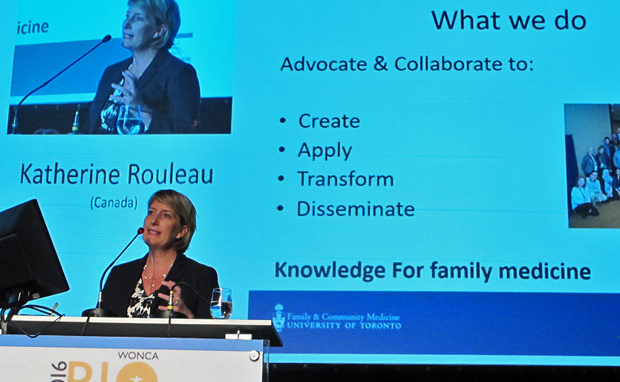Policy bite from Canada : Advocating for Family Medicine internationally.

español
This month’s Policy Bite is our first ‘external invite’ and has been written by Professor Katherine Rouleau of the Besrour Centre, which is linked with our WONCA Member Organization - the College of Family Physicians of Canada. Prof Rouleau’s submission shows how a member organization can try to impact on government through participating in an official consultation. We are grateful to her for sharing their example and thinking. Prof Amanda Howe, President.
The Policy Document
The Government of Canada has recently undertaken a public review and consultation to renew Canada’s international assistance policy and funding framework. The Besrour Centre of the College of Family Physicians of Canada submitted a response which highlighted the strengthening of global family medicine and primary care as a key element of Canada’s international development policy, and as a key pathway to health equity.
Link to response document
The response took into account aspects of the country’s political context – a recent election which brought forward key questions about the role Canada could and should play on the global stage, including the need to focus on women, and girls (including adolescent girls). The submission highlights the relevance and potential contribution of robust family medicine to a number of global health strategies. These include:
- the integration of the health agenda for women, adolescent girls, and girls beyond vertical programs, into a comprehensive health care approach;
- health systems strengthening and resiliency;
- the ability to address the emerging double burden of communicable and non-communicable diseases;
- the achievement of the Sustainable Development Goals;
- and the need to close the gap in human resources for health.
Ultimately, the impact of this submission on the health of individuals and communities around the world and on the ability of global family medicine to fulfil its potential, lies in our own ability, as a family medicine community, to present a coherent and well coordinated voice to beckon and guide the development of evermore robust and effective family medicine globally.
Extract from Response document:
A strong primary health care system translates into healthy women, girls and children. In order to address inequity, robust primary care systems and family medicine must be developed to not only address the health needs of women, girls and children, but to do so in an integrated manner, anchoring care around the individual and the family for life and across all health issues. When a strong primary health care system is in place, women, girls and children receive all or most health services from a single point of service where they are known to the providers. Family medicine-oriented models of care, for example, can support pregnancy follow-up and delivery, provide quick in-time referrals, manage common and deadly children ailments, diarrheal, acute respiratory infections and malaria, early in the course of the illness and close to the patient’s family.
The Message
We share this with WONCA members in the hope that it shows how to describe family medicine as a necessary and key element of global health and international development efforts - an essential offering of robust health systems. It also paves the way for other low, middle and high income countries to similarly demand that family medicine be included as an essential pillar of health systems strengthening.
The Authors
Dr Katherine Rouleau
The Besrour Centre
College of Family Physicians of Canada
The Besrour Centre wishes to acknowledge Dr. Francois Couturier of Université de Sherbrooke and Ms Ophelia Michaelides of the Besrour Centre for their contribution to the original document.
More about the Besrour Centre
Feedback
Comment and questions are very welcome - these can be addressed to [email protected]
Or join the online discussion under "Policy BItes"
Login to the WONCA discussion forum
Join the WONCA discussion forum